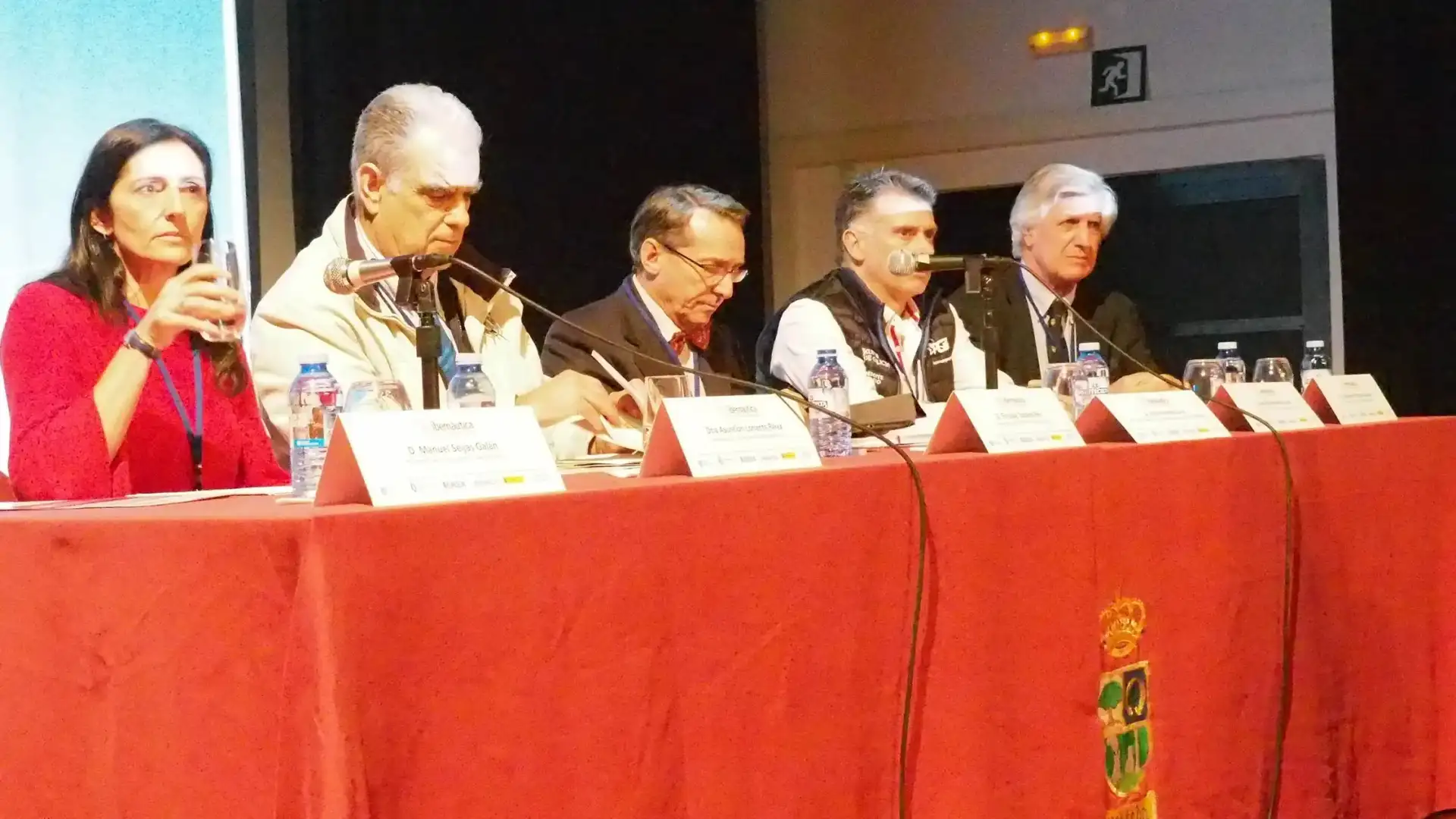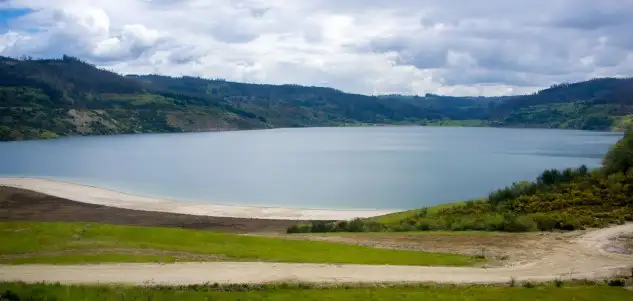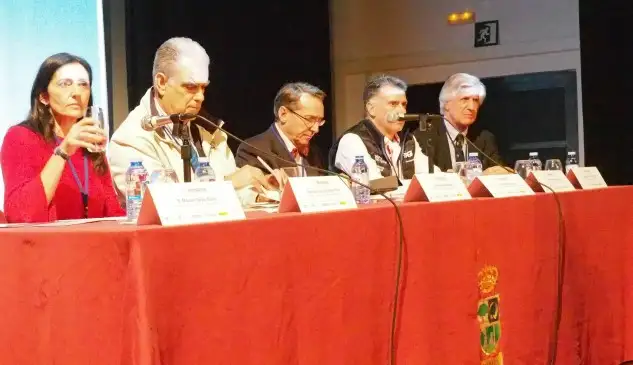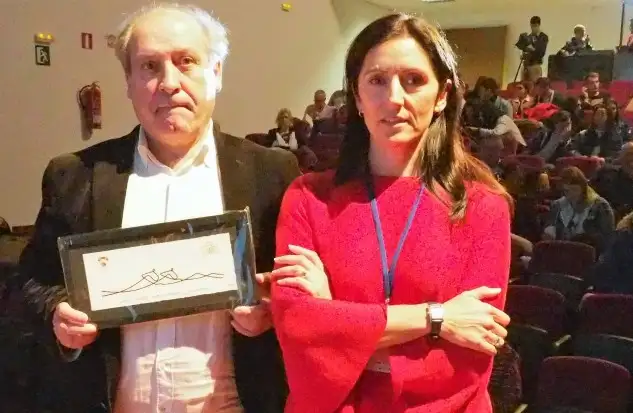
Abanca Week: Ibernastic concludes in Cerceda, after a brilliant edition
Abanca Week: Ibernastic concludes in Cerceda, after a brilliant edition
Nava Castro, Director of Tourism of Galicia, highlighted in his intervention within the Iberonautical Congress, which is held with the support of the Diputación de A Coruña and the City Council of Cerceda, that "Galicia has a great potential of rivers and lakes to promote the tourism development within the Community."
It made clear the actions being carried out from the Council for the first promotion of sports practice, such as the improvement of access to river resources and the creation of infrastructure to improve navigability. In this sense he highlighted the lines of help with municipalities, local and geo-destination entities and as an example he spoke of the first inclusive boarder in Tomiño, about the Miño River, the Lampra Road or the as Conchas swamp, in Ourense.
These actions have to serve "to diversify supply and depark it as a priority objective." Examples of this type of deetationalization of the offer, and which already offers good results, pointed out the plan of the tourist trains and the enoturism that capture out-of-season travelers to value these new geodestinations.
Another important participation, in the cast of speakers from Ibernática, was that of Jose Manuel Rodríguez, manager of INORDE (Instituto Ourensán de Desarrollo Económico), which under his direction is focused on giving visibility to the geographical potential and facilities that Ourense has and although it acts in various fields for the economic development of the Province, a fundamental plot in his plan of action is sports and thermal tourism.
In fact, he said, they have achieved more than 19,000 stays this year, especially between Laias and Arnoia, and that, with creativity, they have made Ourense almost compulsory for national rowing selections across Europe. "El Inorde, he said, does not market, but does promote," said Jose Manuel Rodríguez.
At another time he said that general sports tourism a volume of about 10 billion euros, where the Inorde wants to be. In fact, its most prominent promotions in this field are the Ciclisto Tour to Spain and its integration into the Suzuki team at the national level. He then presented coordinated events in the province, which are already known to the world as the competition that takes place in the Xurés, with a maximum of 1,000 cyclists from all over the world.
Previously María Troncoso Calvo, Communication Manager at Coca Cola spoke of the company's sustainability strategy, as well as the plans to collect packaging to recycle, its activation on the beaches and that, with the help of trawlers, at sea, operations where they have already collected more than 25,000 kilos of waste.
Climate change may be the subject of debate about its intensity, but "if glaciers go back and disappear, we are not theorizing or speculating on future possibilities," said Jose Antonio Quiroga Díaz, president of the Miño-Sil Hydrographic Confederation, at the opening of the Iberonautical Congress, dedicated as a unique theme on this occasion to the "Inner Waters: Recovery of Natural, Mino-industrial spaces and their sustainable uses."
In this sense Jose Antonio Quiroga pointed out that "specific and specific measures are necessary that go along with a range of cross-cutting policies that help to prepare not only the territory but also the society and, also, within these policies" the sustainability of water resources is a cornerstone to be taken into account in order to strengthen those policies. "
It also outlined the policies of the Ministry of the Ecological Transition in the areas of combating climate change, protecting natural heritage, biodiversity, and the sea, water and energy for the transition to a more ecoloxic productive and social model.
Within Ibernática, a congress that sponsors the Diputación de A Coruña and the City Council of Cerceda, Roberto Arias Sánchez, Deputy Director General of Aguas de Galicia, then spoke of the "Meirama project and its conversion to other uses." As the author of the project that involves, among other functions, the construction of an underground tunnel, with a length of a mile, to drive the water of Meirama and that "ensures for life the water supply to the city of A Coruña and zone of influence." At the moment, he said, the lake is being dazzled and he also exposed the future use of play and sports for the modes of sailing, rowing or pyragüism.
The management of water uses and environmental policies was the theme of the round table held next in which the president of the Diputación, Valentín González Formoso, and mayor of As Pontes, spoke of the lake of his municipality. The management carried out over the 10 square kilometres that the mine now has filled with water, the work of care on biodiversity, its technical management and the current applications for different sports practices and that include its environment, as well as the comprehensive plan in which it is working.
For its part Jaime Castiñeira, director of Emalcsa, who supplies a population of 400,000 inhabitants in the city of A Coruña and its hinterland, made a review of the history in the treatment of the waters for human consumption, pointed out that "water is a heritage of humanity and a right of people," abiding in the great solution that is now and for the future the Lake of Meirama, next to the Cecebre reservoir, by the connection through the Barcés river, but also affected the necessary treatments and care for the future.
Roberto González Phillipon, deputy director of mining assets of Naturgy explained the history of the mine since Limeisa was established in 1974 and that the exploitation of the mine began in 1980, although only five years later the first rehabilitation plan was already developed. The operation lasted until 2008 and a year later the mine was given the right to fill.
He noted that the lake is just over 2.2 kilometres long by 1.2 wide and "it was made a lake with permanent life," thanks to the isolation from the filling. He said that there are currently 862 species of fauna and flora and that with the closure of the compound the number continues to increase. This regeneration and environmental care also includes the planting of more than 500,000 trees and this has to be the main concern of maintaining the entire park, not only the water but its environment.
For her part, the director of Aguas de Galicia, Teresa Gutiérrez López, spoke of the powers assumed when it was transferred to the Autonomous Community as well as the lines of action in which they already intervene within the Meirama Project.
In the afternoon the congress focused on the "Evolution of rural gastronomy in the interior of Galicia," as well as the gastronomy in the Caminos de Santiago, where Jose Mouriño, promoter of Denominations of Origin in Galicia; Manuel Rodilla de la Bodega Finca Millara, in the Ribeira Sacra, Jesús Quintá García, president of the Council Regulator of the Castaña de Galicia; Guillermo Campos, founder of the magazine Catería y Turismo de Galicia (HgT); and Elena Zulueta de Madariaga, director of the school of hospitality and in the technical course of the Vigo, made a change in the course of the course of the city. "He provided medical details advising an alkaline diet and the importance of oxygen in the ceclules to prevent diseases. Its recommendations: a greener meal; cooking at low temperature; employing more raw food (salads, fruits..). He drew on the ideal of a diet consisting of 15 percent protein and 85 percent vegetable food.
The members of the Federation of Gastronomy Academies also spoke and the president of Ibernática Francisco García de Bobadilla acted as moderator.
The second day, on Friday, of Ibernática, will be dedicated to the economic development of the internal waters of Galicia and its tourist uses, with notable participation of professors and professors of the Universities of Santiago and A Coruña. There will also be a table at which there will be talk of sports practice in inland waters in both Galicia and the rest of Spain, with the participation of national and autonomous presidents of the federations of Remo, Piragüismo and Vela. This congress will end with a talk on tourism development in the Galicia del interior, by María Nava Castro, director of the Axencia de Turismo de Galicia.
14 / 11 / 2018: José García Liñares inaugurates an Iberonautics dedicated to "Inner waters" in Cerceda

An example of ecology and environmental sustainability: the recovery of the old lignite mines of Meirama, to make it a place of a unique beauty, which will be of public ownership in 2019... the fans of rowing, pyragüism and sailing are of congratulations... as well as the professionals and industry of sustainable inland water tourism (Photo Naturgy)
Forty speakers at the highest level will participate on Thursday and Friday in the auditorium of the Municipal Civic Centre, on the recovery of natural, industrial and sustainable areas, as the main theme of the third edition of Ibernática, chaired by Francisco García de Bobadilla and directed by Victor Montero, and sponsored by the Diputación de A Coruña, the City Council of Cerceda and Abanca. It also has the support of the Xunta de Galicia, the Ministry for the Ecological Transition, the Universities of Santiago and A Coruña, the Spanish Center for New Professions, the Water and Environment Engineering Group or the Federation of School of Gastronomy of the Camines of Santiago, as well as numerous private companies. The event will take place at the edge of 9: 30 in the morning, chaired by the mayor of the Coruñesa villa, José García Liñares. Ibernautics is part of the last cycle of the so-called Abanca Week, which includes numerous sports competitions of the sea for several months.
The congress will open thirty minutes later on the same stage, with the inaugural conference by Jose Antonio Quiroga Díaz, president of the Miño-Sil Hydrographic Confederation of the Ministry for the Ecological Transition. With the intervention of José García Liñares, mayor of Cerceda and Diputado de Sportes of the Diputación de A Coruña, Roberto Arias Sánchez, Deputy Director General of Augas de Galicia, who will speak of the Meirama Project: Minero-industrial transformation and its conversion to other uses.
The following panel will be a panel discussion on "The Decade of Water for Sustainable Development" in which will be attended by Valentín González Formoso, president of the Diputación and mayor of As Pontes; Teresa Gutiérrez López, director of Augas de Galicia; Jaime Castiñeiras de la Torre, director-manager of Emalcsa; Alberto Anta Montero, deputy commissioner of the Hydrographic Confederation Miño-Sil; Roberto González Phillipon, deputy director of Naturgy; Ricardo Juncosa Rivera, of the Water Engineering Group (University of Coruña), as well as the UPT (University of the Environment).
The afternoon session, starting at 4: 00, will begin with the theme "Evolution of rural gastronomy in the interior Galicia." The table will be moderated by Francisco García de Bobadilla, president of Ibernática and general secretary of the Federation of Gastronomy Academies of the Way of Santiago. José Mouriño Cuba, a biologist and promoter of various Denominations of Origin in Galicia, Juan Luis López Díaz, president of Agatur, Manuel Rodilla del Barrio, of the Bodega Míllara, will participate.
The next discussion table will be made up of experts in the gastronomy sector, such as Jesús Quintá García, president of the Regulator Council of the Castaña de Galicia; Guillermo Campos Piñón, founding director of the magazine Catering and Tourism of Galicia; and Elena Zulueta de Madariaga, director of the School of Catering "Harina Blanca," in Vigo.
The last event of this first day of Ibernática will be dedicated to gastronomy in the Caminos de Santiago, in which members of the Federation of Academies of Gastronomy of the Caminos de Santiago will participate, and among them María del Mar Churuca Baríe, president of the Basque Academy.
The second day, on Friday, of Ibernática, will be dedicated to the economic development of the internal waters of Galicia and its tourist uses, with notable participation of professors and professors of the Universities of Santiago and A Coruña. There will also be a table at which there will be talk of sports practice in inland waters in both Galicia and the rest of Spain, with the participation of national and autonomous presidents of the federations of Remo, Piragüismo and Vela. This congress will end with a talk on tourism development in the Galicia del interior, by María Nava Castro, director of the Axencia de Turismo de Galicia.
© 2024 Nautica Digital Europe - www.nauticadigital.eu













